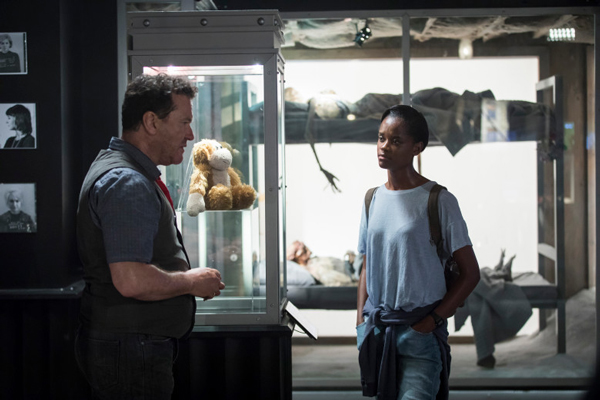The Dark Web of ‘Black mirror’

Black Mirror Season 4’s most-talked about episode is “Hang the DJ”— which tells the story of two people who fall in a love in a mysterious world that’s run by a dating algorithm system.
In Netflix’s sci-fi anthology Black Mirror, consciousness can be copied like computer files. In the Season 4 premiere, “USS Callister,” it can be placed inside a game controlled by a vindictive coder. In the season finale, “Black Museum,” it can be implanted in another person, as with a deceased wife, whose consciousness is installed inside her husband’s body. In the much-talked-about romantic episode of the season, “Hang The DJ,” it can be placed inside a computer simulation, where a relationship can be tested 1,000 times to analyze a couple’s compatibility.
This technology has popped up in previous seasons as well. Season 2’s “White Christmas” features a consciousness-copying chip that can be placed in any simulated environment, where programmers can play god with the copies. In what’s commonly regarded as Black Mirror’s best episode, “San Junipero,” copies are placed in a digitized “heaven,” where terminally-ill people can sample before possibly “passing over” as a copy upon death.
Black Mirror is this generation’s Twilight Zone, but with technology as the other dimension. With a few exceptions — such as “San Junipero” and “Hang the DJ” — every episode acts as an extreme cautionary tale of how technology can ruin our lives and make us less human. But consciousness digitization seems to be the series’ main obsession, this idea that our minds can somehow be replicated through computer simulation and that it can be so accurate as to convince the simulated mind of its realness. The simulation feels pain, experiences time, and holds all of the original’s memories and traits.

In the season finale “Black Museum” — a woman enters a grisly crime museum. The latest season of Black Mirror is now available on Netflix.
This is a curious obsession, considering that among all the technologies featured throughout four seasons of Black Mirror, consciousness digitization might be the least feasible. “There is no practical way of uploading the entire consciousness of a human to an external carrier,” says neurobiologist Mikhail A. Lebedev in an interview with culture website The Ringer. “We know absolutely nothing about the mechanisms of consciousness. I believe that this quest for the origin of consciousness is doomed.”
But good science fiction isn’t really about the feasibility of the science; it’s about morality. The idea that our consciousness can be copied and shared like an episode of Black Mirror is a severely cynical thought. It effectively cheapens what is essentially our souls: the totality of our experiences and emotions broken down into a series of zeroes and ones. It also raises an interesting philosophical question: what makes us human? Is it our body or our mind? If it’s the latter, then the coders who play god over their consciousness copies in episodes like “USS Callister” and “White Christmas” are basically committing a heinous violation of human rights, enslaving these copies in prison-universes they have created. If our mind is what makes us truly human, then copies of our consciousness are as real as us, and so are their pain and suffering. In “USS Callister,” a coder copies the consciousness of his co-workers using DNA scraped from leftover food and basically treats their copies as slaves inside his self-designed galactic fantasy. It’s truly nefarious stuff that can only be rivaled by serial killer-type crimes — but the coder carries on his real life day job as though he’s a completely normal person. Does he think that the copies inside his narcissistic game aren’t real because he sees the original versions every day in his office? If so, does that mean that he has perfected the technology without really appreciating its implications?
This, I suppose, is the central problem raised by Black Mirror. It’s not really saying that consciousness can realistically be copied; what makes these episodes chilling is that the insanity behind them is realistic. Mankind doesn’t have a great track record of innovation guided by wisdom. Technology tends to develop faster than our capability to understand its practical effects. Mark Zuckerberg perfected social media technology, but remains ignorant of (or oblivious to) Facebook’s contribution to fake news and the general dumbing down of society. It was all cute when we suddenly had this capability to catch up with old friends and “like” their pictures. It’s not so fun anymore when propagandists use the same technology to spread lies and prop up a tyrannical government. That sounds a lot like a typical Black Mirror episode.
Maybe consciousness digitization is a metaphor for what’s already happening online. Our social media personae are not quite us, but it’s out there, uploaded in a simulated reality where some of us act more freely, unbound by ethics, while some of us suffer, constantly attacked by those who suddenly feel powerful in a virtual space. The coder in “USS Callister” is every troll on the internet who is actually a loser in real life, gaining power with every lie, with every alteration of reality. Black Mirror’s obsession with consciousness digitization isn’t really a peek into an unrealistic future. It’s a fable of our very real everyday life.















